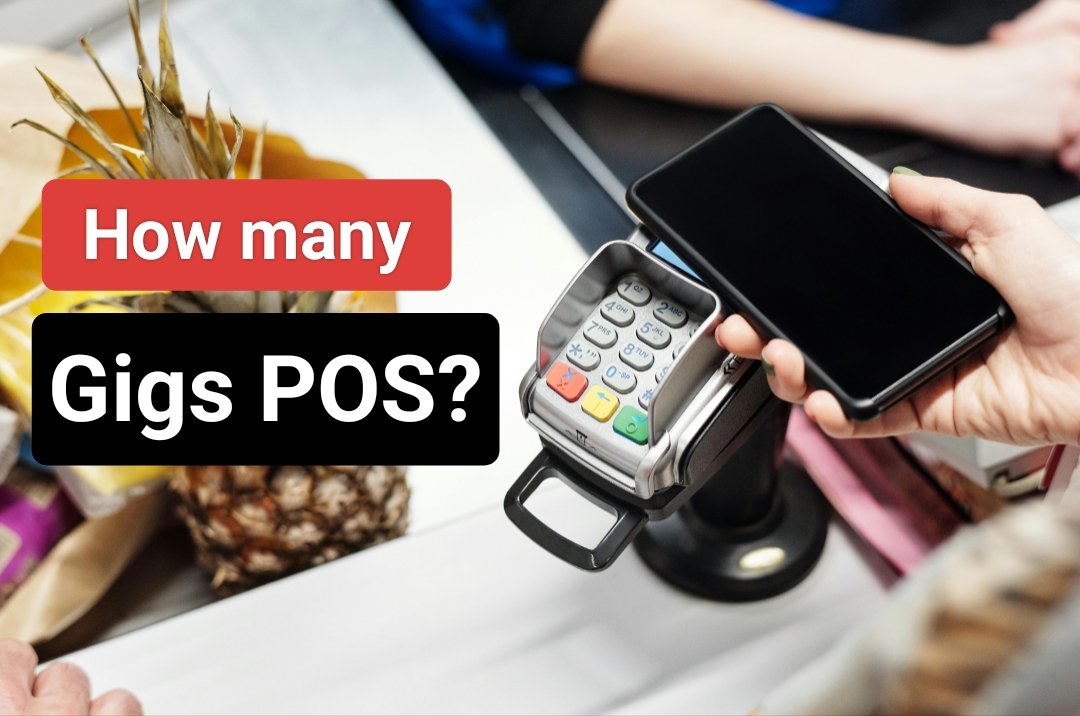Technology
Blog Title: How Many Gigs POS? Understanding the Rise of POS Systems in the Gig Economy

Introduction
The gig economy has undergone tremendous growth in recent years, fueled by advances in technology, changing work patterns, and the increasing desire for flexibility. Workers and businesses alike are embracing this new mode of employment, which often involves short-term contracts, freelance jobs, and independent contractor work. However, as the gig economy grows, so too does the need for tools that can streamline business operations. One such tool is the Point of Sale (POS) system, which has seen significant adoption among gig workers and small businesses.
But how many gigs POS systems are actually being used? What role do they play in this rapidly evolving space? In this blog, we’ll analyze the prevalence of POS systems in the gig economy, their impact on different sectors, and how they’re empowering freelancers and small businesses to thrive in a competitive marketplace.
What is a POS System?
Before diving into the numbers, let’s define what a POS system is and why it’s important in today’s gig economy.
A Point of Sale (POS) system is a combination of hardware and software that allows businesses to process transactions and manage operations. Traditionally, POS systems were used in brick-and-mortar retail stores to facilitate sales, track inventory, and generate receipts. However, with the growth of digital technology, modern POS systems are much more versatile and can be used by a wide range of businesses, including those operating in the gig economy.
Key Features of a POS System:
- Transaction Processing: Facilitates cash, card, or mobile payments.
- Inventory Management: Tracks stock levels and product sales in real-time.
- Customer Relationship Management (CRM): Helps store customer information for better service.
- Sales Analytics: Provides insights into sales trends, profits, and customer preferences.
- Mobile POS (mPOS): Enables businesses to accept payments on the go, ideal for freelancers and gig workers.
In the context of the gig economy, POS systems help independent workers manage their sales, track their earnings, and offer their clients professional payment experiences, even if they don’t operate from a fixed location. This flexibility is especially crucial for freelancers, market vendors, rideshare drivers, and other gig workers.
Section 2: How Many Gigs POS Systems Are Being Used?
It’s difficult to provide an exact number of how many gig workers use POS systems, but current data gives us a solid indication of the growing trend. As of 2023, the global POS market was valued at $85 billion, with the gig economy playing a significant role in driving demand for more mobile and flexible POS solutions.
Mobile POS (mPOS) Adoption:
The rise of mobile POS (mPOS) systems has been one of the most significant trends in the gig economy. According to recent statistics, over 50% of small businesses and independent contractors use mobile POS systems to handle payments on the go. These systems offer convenience and flexibility, especially for workers who operate in temporary or non-traditional business locations such as food trucks, pop-up shops, and delivery services.
Key sectors where gig workers and freelancers use POS systems include:
- Freelance services (e.g., photographers, artists, graphic designers)
- Delivery services (e.g., food couriers, package delivery drivers)
- Craft and artisan markets (e.g., Etsy sellers, craft fair vendors)
- Ride-sharing and transport services (e.g., Uber, Lyft drivers offering in-car product sales)
- Pop-up restaurants and food vendors
Growth of POS Systems Among Freelancers:
As of 2022, there were approximately 57.3 million freelancers in the U.S. alone, and this number is expected to rise in the coming years. Many of these freelancers are adopting POS systems to offer seamless payment experiences, both online and in person. In fact, 32% of gig workers reported that they used some form of POS system or payment gateway to accept payments for their services.
This trend highlights the increasing reliance on technology to manage finances and payments in the gig economy. Whether it’s an mPOS system used by a food truck operator or an e-commerce POS platform for a digital artist selling work online, POS systems are making it easier for freelancers to manage their businesses effectively.
Types of POS Systems in the Gig Economy
There are various types of POS systems designed to meet the specific needs of gig workers and small businesses. Each system has unique features tailored to different types of gigs, making it easier for independent contractors to choose the best option for their operations.
1. Mobile POS (mPOS) Systems
Mobile POS systems are the most widely adopted POS solutions in the gig economy. They allow gig workers to accept payments using smartphones or tablets, making them ideal for freelancers who do not have a permanent business location.
Popular mPOS options include:
- Square
- PayPal Here
- Zettle by PayPal
- SumUp
These systems are affordable, easy to use, and provide a range of features that help small businesses and gig workers process payments, track sales, and manage customer data.
2. Cloud-Based POS Systems
Cloud-based POS systems operate entirely online, making them perfect for freelancers who offer digital services or manage e-commerce stores. These systems store all transaction data in the cloud, allowing users to access their information from any device with an internet connection.
Examples include:
- Shopify POS
- Vend
- Lightspeed
Cloud-based POS systems offer features such as inventory management, sales reporting, and customer management, making them a great choice for digital entrepreneurs.
3. Traditional POS Systems
While traditional POS systems are more commonly associated with physical stores, some gig workers and small businesses still opt for these setups, especially if they operate from a fixed location (e.g., brick-and-mortar artisan shops or small cafes). These systems provide a more comprehensive set of tools but tend to be more expensive and less flexible compared to mobile and cloud-based solutions.
Benefits of POS Systems for Gig Workers
For gig workers, adopting a POS system offers a range of benefits that go beyond simply accepting payments. Here are some key advantages that POS systems bring to the table:
1. Improved Efficiency
With a POS system, gig workers can process transactions faster and more efficiently. Whether accepting cashless payments or sending digital receipts, these systems help streamline the payment process, allowing freelancers to focus more on delivering their services.
2. Better Financial Management
POS systems offer built-in sales analytics, allowing gig workers to keep track of their earnings, expenses, and sales trends. This data can be invaluable when managing finances, filing taxes, or making decisions about pricing and inventory.
3. Enhanced Customer Experience
A professional POS system enables gig workers to offer better customer experiences, from providing accurate receipts to managing loyalty programs. These small touches can help freelancers build stronger relationships with their clients and encourage repeat business.
4. Flexibility and Mobility
For gig workers who operate on the move, mobile POS systems allow them to accept payments anywhere, whether at a pop-up shop, a client’s home, or an outdoor event. This level of flexibility is essential in a gig economy where work locations can change frequently.
5. Inventory and Order Management
For gig workers who sell physical products (e.g., crafters, artists, food vendors), POS systems with inventory management features help them keep track of stock levels and reorder supplies when needed. This reduces the risk of running out of products during busy periods and helps streamline the fulfillment process.
Challenges and Considerations for Gig Workers Using POS Systems
While POS systems offer numerous benefits, there are also challenges and considerations that gig workers need to keep in mind:
1. Initial Setup Costs
Depending on the type of POS system, there can be an upfront cost for purchasing hardware and software. While mobile and cloud-based systems tend to be more affordable, traditional POS systems can be expensive, especially for gig workers just starting out.
2. Transaction Fees
Most POS systems charge transaction fees for credit card payments. These fees can vary depending on the provider, but they typically range between 1.5% to 3% per transaction. For gig workers handling a high volume of small transactions, these fees can add up over time.
3. Learning Curve
Although many modern POS systems are user-friendly, there is still a learning curve involved in setting up and using the system effectively. Gig workers need to invest time in understanding how to use the POS features, which can be challenging for those without prior experience.
The Future of POS Systems in the Gig Economy
As the gig economy continues to grow, the demand for flexible, mobile, and cloud-based POS systems is likely to increase. According to industry reports, the global mobile POS market is expected to reach $3.1 billion by 2025, with freelancers and small businesses driving much of this demand.
Several trends are expected to shape the future of POS systems in the gig economy:
- Increased adoption of AI and machine learning: Future POS systems may incorporate AI to offer personalized customer experiences, optimize inventory management, and provide advanced sales insights.
- Integration with other gig platforms: POS systems may be integrated with popular gig platforms like Fiverr, Upwork, and TaskRabbit to streamline payments and sales tracking for freelancers.
- Improved payment security: With cyber threats on the rise, POS systems will likely focus on enhancing payment security through encryption, tokenization, and biometric authentication.
Conclusion
In conclusion, the adoption of POS systems in the gig economy is on the rise, with more freelancers and small businesses recognizing their value in streamlining operations and enhancing customer experiences. Whether it’s mobile POS systems for on-the-go transactions or cloud-based platforms for digital entrepreneurs, POS systems offer essential tools that empower gig workers to succeed in an increasingly competitive market.
As the gig economy continues to evolve, so too will the demand for more advanced, flexible, and cost-effective POS solutions that cater to the unique needs of independent workers.
